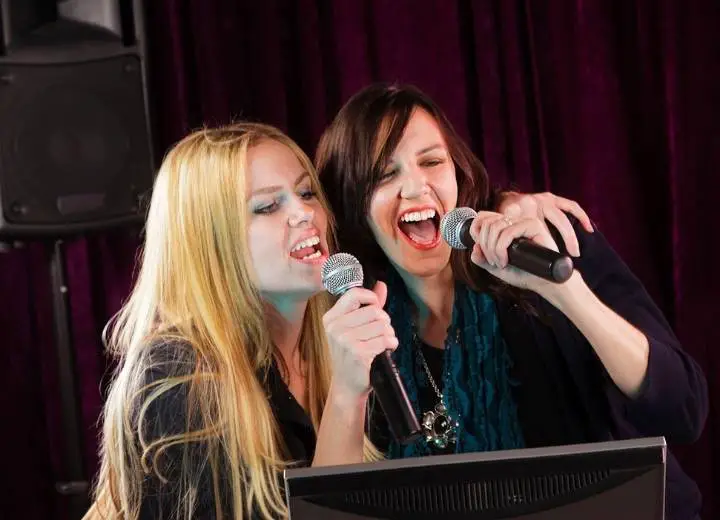
Even if you’re a Karaoke hobbyist, you may have no idea what its name refers to. Does Karaoke mean tone deaf? What is the story behind it? Let’s discover!
Does Karaoke Mean Tone Deaf? The Answer May Surprise You
No. Although karaoke is a Japanese word literally meaning tone-deaf. However, contrary to the common belief that Karaoke implies good vocals, it refers to tone-deaf people who can’t sing the keys correctly.
Who First Invented Karaoke?
Karaoke first originated at a snack bar in Japan. A scheduled performer forgot the lyrics and was unable to sing. When luck would have it, the owner played the recorded music and invited all customers to sing along.
When the ‘90s arrived, a Japanese drummer, Daisuke Inoue, came up with the idea of recording songs and selling them to people to sing along, too.
First, he rented Karaoke machines to restaurants, coffee shops, and bars. As this activity became widely popular, many opened Karaoke boxes and offered Karaoke rental services. People could come to these places and sit in a room with a Karaoke system and LED lights and sing together.
Where Did It Come From?
The word ‘Karaoke’ originated from the two Japanese words ‘Kara’ (empty) and ‘Okesutora’ (orchestra). Not until the 1970s did the commercialization of non-vocal recordings happen in Japan. Although it had been around since the beginning of music recording.
Back in the 90s, after spreading across Asia, the Karaoke machine managed to make an entry into the US market. Although the term ‘Karaoke’ was not really popular in the States initially, it slowly grabbed the public’s attention. More and more invested in a home theater system to enjoy being an amateur singer.
Nowadays, Karaoke is a mainstream part of Asian culture. Karaoke bars are the common venue to go and sing, providing professional Karaoke technology and services.
Does Karaoke Mean Tone Deaf?
Many people believe that Karaoke doesn’t mean tone-deaf. This term involves singing along pieces of songs. How can it imply tone-deafness when it’s a means of music enjoyment?
Well, surprisingly, the answer is yes. Karaoke’s original meaning is tone-deaf.
What Is Tone Deafness?
Tone deafness, or congenital amusia, is the insensitivity to differences in musical pitches. This lifelong syndrome of music impairment affects 4% of the population.
Simply put, tone-deaf means you can’t hear a note or tune. The term specifically involves note deadness, tone deafness, tune deafness, congenital amusia, and dysmelodia.
People suffering from this impairment don’t process music the same way as normal people. For them, listening to a song is like listening to a lecture in a foreign language.
Amusia people can identify speakers by their signature voices and recognize familiar sounds around them. However, they are different since they can’t recognize a song without the lyrics.
What Does Karaoke Mean?
The Japanese word “Karaoke” combines two separate words: “kara” (empty) and “oke” (orchestra).
‘Karaoke’ simply refers to an amateur singer singing along to recorded songs without vocals. He sings passionately without caring about the notes.
Most Karaoke-singing people seem to miss the right keys, indeed. Because Karaoke generally removes the lead vocal from the recordings, letting singers showcase their original voices.
Can A Tone Deaf Person Sing?
Yes, the tone-deaf can learn to sing with the right methods and support and encouragement. Why do amusia people have to suffer the limitations of singing and appreciating the art of music?
Many people suppose they can’t sing due to lifelong musical impairment. However, most of them can learn to sing better.

The best method to improve your voice is to practice frequently. Practice makes perfect.
Some music schools have specific curriculums for people with congenital amusia. The tone deaf can learn how to associate their sound with what they hear.
Matching pitch is never a breeze for a tone-deaf, but this challenge can’t stop them from trying their best. Tone-deaf people may be bad at singing, but not bad at playing instruments.
An instance of an amusia musician is Jenkin Foster Jenkins. Although she was not able to sing beautifully, Florence could sell out her Carnegie Hall when 76 years old.
Despite many poor reviews, Jenkin’s courageousness and determination to become a great musician are undeniably admirable.
Why Is Karaoke Good For You?
As a means of entertainment, Karaoke comes with tons of physical and mental benefits.
To begin with, consistent practice of singing improves your breathing.
When singing Karaoke, you have to use your entire body. The muscles positioned in your lungs and diaphragm expand to the fullest capacity. As a result, you can breathe with greater ease and more efficiently.
Besides, your stomach’s muscles are also way more relaxed, essentially leading to boosted breathing techniques.
Next, singing Karaoke in part motivates your confidence. Stepping on stage to make a speech in front of a crowd takes a lot of courage. For this reason, Karaoke helps stretch your confidence, ability to control nerves, and self-esteem.
Mentally, you can relieve a great amount of stress when going to a Karaoke box. Singing, in general, promotes the “I-feel-good” or happy hormones (also endorphins) in your body. They end up rushing around your brain and contributing to your positive emotions.
Plus, the major reason why people can relieve stress when singing Karaoke is that they sing along with a song with little care to the tune. As a result, singers would experience great joy.
How To Tell If You’re Tone Deaf?
Many people assume they’re tone-deaf because of the inability to get it correct when singing. However, the thing is, congenital amusia is very rare.
There are some online tests that you can take to determine if you’re tone deaf or not.
People suffering from congenital amusia often experience difficulty in performing a complex range of notes. If you can recognize a song without looking at the lyrics, then you probably don’t have tone-deafness. Maybe you just have poor techniques.
Key Takeaways
You know the answer to the question ‘does Karaoke mean tone deaf?’. Karaoke means everyone doesn’t need to sound good when singing, as long as they appreciate the art.
If someone has a tone-deff gene, they may struggle to hold a tune. However, in the 21st century, nothing is impossible. With intense practice and dedication, notes and keys are easy to catch.
Anyway, singing Karaoke is for everyone. Let’s give it a try!
